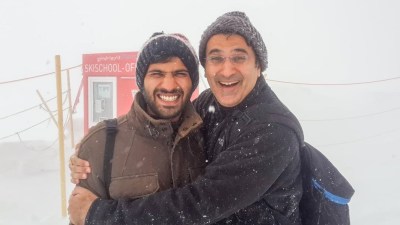Explained Ideas: Lessons from the rise and fall of Hafiz Saeed
Pakistan state's surrender to the cleric embodies the perils of religious ideology, writes Khaled Ahmed.
 Hafiz Saeed at one of his homes in Lahore, Pakistan, Jan. 29, 2013. (The New York Times: Diego Ibarra Sanchez)
Hafiz Saeed at one of his homes in Lahore, Pakistan, Jan. 29, 2013. (The New York Times: Diego Ibarra Sanchez)On November 19, an anti-terrorism court in Pakistan sentenced the chief of Jamaat-ud-Dawa (erstwhile Lashkar- e-Toiba), Hafiz Saeed, to 10 years in jail for “terror financing”. The conviction came as Pakistan tried to avoid blacklisting by the global dirty-money watchdog, the Financial Action Task Force (FATF) which punishes “illicit financing of militant organisations”.
In his latest column in The Indian Express, Khaled Ahmed, consulting editor, Newsweek Pakistan, traces the rise and fall of Saeed — “the man who made the world cower in fear when he organised the attack on Mumbai in 2008”.
From a Kashmiri Gujjar background, Hafiz Saeed lived in Simla before Partition. After 1947, he grew up in Sargodha where his family began farming. Saeed’s father Maulana Kamaluddin was a religious scholar, so was his uncle Maulana Hafiz Abdullah, who later helped in setting up the “terrorist” organisation, LeT.
“Religion serves as an agent of detachment from reality. Saeed’s career embodies this phenomenon,” writes Khaled. After graduation in 1974, was appointed lecturer at the University of Engineering and Technology (UET), Lahore in the Islamiat department. From here, he went for higher studies to Saudi Arabia and became intimate with the infamous Saudi scholar, Sheikh Abdul Aziz bin Baz, who was to pronounce the fatwa of jihad in Afghanistan in 1979. During this phase, he also met with Osama bin Laden several times. 📣 Express Explained is now on Telegram
In 1990, LeT was established in consultation with the Wahhabis in Afghanistan. In 2003, after a career of jihad in Kashmir, the LeT was banned. It then became Jamaat-ud-Dawa and devoted itself to serving al Qaeda as a coordinating agency with networks in Pakistan.
On April 9, 2016, The News disclosed that Saeed had been running stealth
courts in violation of Pakistan’s constitution: “The supra-constitutional Sharia courts, established by JuD, operate across the country and only the Lahore court of this parallel judicial system has issued verdicts in 5,550 cases, including murder trials.”
The “courts” had been going on since 1990 and one had been active even in Islamabad!
Also read | Explained Ideas: How the government should deal with protesting farmers
How did it come about?
“The state had surrendered to Saeed and was helpless to oust him from his spiritual- terrorist empire. The surrender of the state to Saeed was a blend of two contingencies — the evolution of the ideology of the state under Islam, and the drive of a revisionist policy vis-à-vis India,” writes Khaled.
- 01
- 02
- 03
- 04
- 05






































